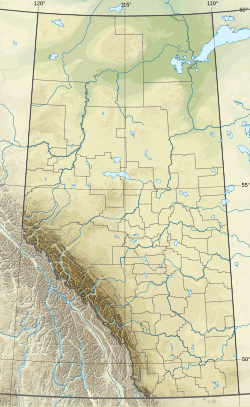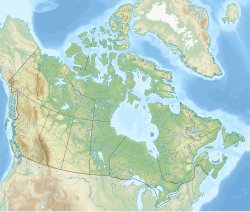Buck Lake, Alberta
Buck Lake | |
|---|---|
| Coordinates: 52°57′06″N 114°46′24″W / 52.95167°N 114.77333°W | |
| Country | Canada |
| Province | Alberta |
| Region | Central Alberta |
| Census division | 11 |
| Municipal district | County of Wetaskiwin No. 10 |
| Government | |
| • Type | Unincorporated |
| • Governing body | County of Wetaskiwin No. 10 Council |
| Area (2021)[1] | |
| • Land | 1.37 km2 (0.53 sq mi) |
| Population (2021)[1] | |
| • Total | 60 |
| • Density | 43.8/km2 (113/sq mi) |
| Time zone | UTC−07:00 (MST) |
| • Summer (DST) | UTC−06:00 (MDT) |
| Area code(s) | 780, 587, 825 |
Buck Lake is a hamlet in central Alberta, Canada within the County of Wetaskiwin No. 10.[2] It is located on Highway 13, approximately 109 kilometres (68 mi) southwest of Edmonton. It is located on the shore of Buck Lake.
Demographics
[edit]In the 2021 Census of Population conducted by Statistics Canada, Buck Lake had a population of 60 living in 35 of its 72 total private dwellings, a change of 17.6% from its 2016 population of 51. With a land area of 1.37 km2 (0.53 sq mi), it had a population density of 43.8/km2 (113.4/sq mi) in 2021.[1]
As a designated place in the 2016 Census of Population conducted by Statistics Canada, Buck Lake had a population of 51 living in 23 of its 57 total private dwellings, a change of -32% from its 2011 population of 75. With a land area of 1.27 km2 (0.49 sq mi), it had a population density of 40.2/km2 (104.0/sq mi) in 2016.[3]
See also
[edit]References
[edit]- ^ a b c "Population and dwelling counts: Canada and designated places". Statistics Canada. February 9, 2022. Retrieved February 10, 2022.
- ^ "Specialized and Rural Municipalities and Their Communities" (PDF). Alberta Municipal Affairs. June 3, 2024. Retrieved June 14, 2024.
- ^ "Population and dwelling counts, for Canada, provinces and territories, and designated places, 2016 and 2011 censuses – 100% data (Alberta)". Statistics Canada. February 8, 2017. Retrieved February 13, 2017.


